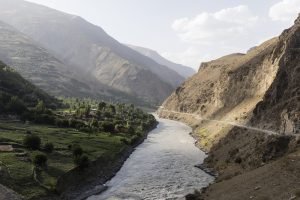Ivan U. Klyszcz

The fast Taliban takeover of Kabul has been met with diverse reactions in Central Asia. In Turkmenistan and Uzbekistan, the attitude has been one of pragmatism with strong signals about security. Other external actors, such as China and Russia, have been conciliatory toward the Taliban, even hinting at formal recognition. Tajikistan’s long-time ruler Emomali Rahmon diverged from his Central Asian partners and treaty allies to signal opposition to the Taliban takeover and expressed sharper concern about the presence of international terrorist groups in Afghanistan.
Dushanbe has been open about its preferences in Afghanistan, namely, the formation of a government that is not monopolized by the Taliban and that represents Afghanistan’s Tajik population. On August 25, Rahmon said that he would reject an Afghan government “created by humiliation and ignoring the interests of the people of Afghanistan as a whole, including those of ethnic minorities, such as Tajiks, Uzbeks and others.” This contrasts sharply with Russia’s Vladimir Putin, who commented on August 20 that the Taliban takeover is a reality from which external actors must proceed in Afghanistan. Turkmenistan, for its part, has reportedly engaged the Taliban in dialogue to protect its border, and Uzbekistan has mostly followed the pragmatic line of the Collective Security Treaty Organization (CSTO) — notably, an alliance Tashkent is not a member of.
Dushanbe’s divergence is significant and hints at Tajikistan’s emerging role in the current international response to the Taliban takeover. Generally, the U.S.-NATO withdrawal is regarded as an opening for China and Russia to increase their influence in Central Asia. For the small states of the region, this may represent fewer available alternatives to the Beijing and Moscow policy lines. Because of Tajikistan’s size, small economy, and internal troubles, some would be quick to dismiss Dushanbe as a mere policy-taker from its larger allies, chief among them Russia. Indeed, Russia is the largest CSTO member, provides security for Tajikistan’s Afghan border, and is the major destination for Tajik labor migrants. In 2019, remittances were equivalent to 30 percent of Tajikistan’s GDP.
Dismissing Tajikistan’s impact in Afghanistan is misguided, however. Small states frequently have assets that can position them as pivotal actors for their larger allies, especially during critical junctures. In the case of Tajikistan, its large border with Afghanistan (over 1,300 kilometers), its kinship with the Afghan Tajiks (about 25 percent of the Afghan population), and the fact it hosts Russia’s largest military base abroad are all important levers for Dushanbe in Afghanistan. There are limits to Tajikistan’s influence in Afghanistan, of course, especially with the Afghan Tajiks. For instance, it has been reported that the Panjshir Tajiks — where the anti-Taliban opposition has found refuge — do not look to Tajikistan for support. Yet, these assets have already enabled Rahmon to diverge from its larger allies and take a leadership position in opposing the Taliban takeover.
On the international stage, Rahmon has gained some clout from his openly anti-Taliban position. For instance, France’s Emmanuel Macron invited Rahmon on August 30 to visit Paris in October. Tajikistan could become a critical facilitator should the international community choose to oppose the Taliban. More immediately, Tajikistan would be a critical player in handling continued refugee flows coming from Afghanistan. There are no official counts of Afghan refugees, but some Tajik regional authorities have already received hundreds of people fleeing the Taliban. During the international evacuation of Kabul, Tajikistan and Uzbekistan played a critical role as transit points for evacuation flights.
In the region, Dushanbe could shape the policy of its allies. Tajikistan is the only CSTO member with a border with Afghanistan. Thus, it is the most dependable conduit for the alliance to access Afghanistan. This on its own might not suffice to enable Dushanbe to push the CSTO toward an outright anti-Taliban policy. Yet, its critical location and connection to the Tajik Afghans may act as leverage for Dushanbe to advocate for the CSTO to press the Taliban to form an inclusive government. Already hinting at convergence with Tajikistan’s position, on August 27 Russian Foreign Minister Sergey Lavrov said that Afghanistan should form “an inclusive transitional government.”
Finally, the U.S. withdrawal from Afghanistan and diminished presence in Central Asia more broadly do not imply that Washington will not engage Tajikistan. While U.S. bases are not forthcoming, the U.S. may see Dushanbe as a potential partner in Afghanistan. In spite of the asymmetry in the relationship, Moscow cannot afford to alienate Dushanbe, so the latter’s policy preferences can be expected to play a larger role in the near future.
No comments:
Post a Comment